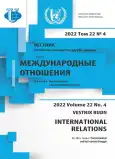Relations between the Non-Aligned Countries of Africa and the Second World (1960-1980s): The Case of Sierra Leone
- Авторлар: Shipilov A.Y.1,2
-
Мекемелер:
- Peoples’ Friendship University of Russia (RUDN University)
- Institute of World History, Russian Academy of Sciences
- Шығарылым: Том 22, № 4 (2022): Postcolonialism and Anti-colonial Struggle
- Беттер: 700-713
- Бөлім: THEMATIC DOSSIER
- URL: https://journal-vniispk.ru/2313-0660/article/view/320511
- DOI: https://doi.org/10.22363/2313-0660-2022-22-4-700-713
- ID: 320511
Дәйексөз келтіру
Аннотация
The research covers Sierra Leone’s relations with the Second World through the prism of Sierra Leone’s foreign policy. Two periods of Sierra Leone’s foreign policy are considered: during the Westminster bipartisan model from 1961 to 1970, and when the authoritarian regime led by President Siaka Stevens was established from 1971 to 1985. The central issue of the research is analysis of Sierra Leone’s cooperation with the Soviet Union. The aim of the research is to identify the factors that guided the non-aligned countries within the bipolar confrontation of the second half of the 20th century in building their relations with the socialist bloc. The relevance of the topic is related to the fact that the logic and principles of building relations of small non-aligned countries with both limited power resources and little political and economic ambitions with key world powers are less reflected in studies. The research is based upon comparative and historical-genetic methods as well as case studies. The author makes use of materials from the Sierra Leone Public Archives. The author concludes that Sierra Leone’s relations with the Second World were based on economic pragmatism rather than ideological or political proximity. For Sierra Leone, relations with socialist countries served as a tool for diversifying its foreign policy. This set Sierra Leone apart from its neighboring West African states, which either maintained an orientation towards first-world countries, namely France and the US, or reoriented themselves towards the Soviet Union.
Негізгі сөздер
Авторлар туралы
Alexander Shipilov
Peoples’ Friendship University of Russia (RUDN University); Institute of World History, Russian Academy of Sciences
Хат алмасуға жауапты Автор.
Email: shipilov-ayu@rudn.ru
ORCID iD: 0000-0001-7308-8638
Research Assistant, Department of Theory and History of International Relations, Peoples’ Friendship University of Russia (RUDN University); PhD Researcher, Centre for African Studies, Institute of World History, Russian Academy of Sciences
Moscow, Russian FederationӘдебиет тізімі
- Adamolekun, L. (1976). Sékou Touré’s Guinea: An experiment in nation building. London: Methuen.
- Amin, S. (1967). Le développement du capitalisme en Côte d’Ivoire. Paris: Les Editions de Minuit.
- Chauveau, J.-P., & Dozon, J.-P. (1985). Сolonisation, économie de plantation et société civile en Сôte d’Ivoire. Cahiers Orstom, 21(1), 63-80.
- Dalton, G. (1965). History, politics, and economic development in Liberia. The Journal of Economic History, 25(4), 569-591. https://doi.org/10.1017/S0022050700058423
- Fauré, Y.-A., & Médard, J.-F. (Eds.). (1982). Etat et bourgeoisie en Côte d’Ivoire. Paris: Karthala.
- Filatova, I. I., & Davidson, A. B. (2012). Russia and South Africa: Building bridges. Moscow: Izdatel’skii dom Vysshei shkoly ekonomiki publ. (In Russian).
- Gura, V. K., & Nesuk, N. D. (1981). Challenges and development paths for liberated countries in Africa. Kiev: Naukova dumka publ. (In Russian).
- Kassaye Nigusie, W. M., & Ivkina, N. V. (2020). Features of the political development of Africa in the postcolonial period. Vestnik RUDN. International Relations. 20(1), 22-38. (In Russian). https://doi.org/10.22363/2313-0660-2020-20-1-22-38
- Keen, D. (2005). Conflict and collusion in Sierra Leone. New York: Palgrave.
- Kieh, G. K., Jr. (2012). Neo-Colonialism: American foreign policy and the first Liberian civil war. Journal of Pan African Studies, 5(1), 164-184.
- Kiva, A. V. (1978). Socialist-oriented countries: Main development trends. Moscow: Nauka publ. (In Russian).
- Lüthi, L. (2014). The non-aligned. Apart from and still within the Cold War. In N. Mišković, H. Fischer-Tiné & N. Boskovska (Eds.), The Non-Aligned Movement and the Cold War (pp. 97-113). London: Routledge.
- Mazov, S. V. (2020). USSR and “Union of African states” project, 1963-1964 (based on Russian archival materials). Asia and Africa Today, (5), 66-72. (In Russian). https://doi.org/10.31857/S032150750009555-2
- Mišković, N. (2014). Introduction. In N. Mišković, H. Fischer-Tiné & N. Boskovska (Eds.), The Non-Aligned Movement and the Cold War (pp. 1-18). London: Routledge.
- Mišković, N., Fischer-Tiné, H., & Boskovska, N. (Eds.). (2014). The Non-Aligned Movement and the Cold War. London: Routledge. https://doi.org/10.4324/9781315814452
- Obi, C. (2009). Economic community of West African states on the ground: Comparing peacekeeping in Liberia, Sierra Leone, Guinea Bissau, and Côte d’Ivoire. African Security, 2(2-3), 119-135. https://doi.org/10.1080/19362200903361945
- Pletsch, C. E. (1981). The three worlds, or the division of social scientific labor, circa 1950-1975. Comparative Studies in Society and History, 23(4), 565-590.
- Richter, U. (2011). Impact of globalization on emerging markets: The case of Côte d’Ivoire. In B. House-Soremekun & T. Falola (Eds.), Globalization and sustainable development in Africa (pp. 233-256). Rochester, N.Y.: University of Rochester Press.
- Rothermund, D. (2014). Era of non-alignment. In N. Mišković, H. Fischer-Tiné & N. Boskovska (Eds.), The Non-Aligned Movement and the Cold War (pp. 19-34). London: Routledge.
- Shipilov, A. Yu. (2019). West African international studies: Approaches to regional security. Vestnik RUDN. International Relations, 19(2), 207-217. https://doi.org/10.22363/2313-0660-2019-19-2-207-217
- Solarz, M. W. (2021). Many worlds, one planet. Ambiguous geographies of the contemporary international community. In M. W. Solarz (Ed.), New geographies of the globalized world (pp. 54-76). London: Routledge.
- Taylor, I. (2020). Sixty years later: Africa’s stalled decolonization. Vestnik RUDN. International Relations, 20(1), 39-53. https://doi.org/10.22363/2313-0660-2020-20-1-39-53
- Winter, D., Brown, R., Goins, S., & Mason, C. (2016). Trauma, survival and resilience in war zones: The psychological impact of war in Sierra Leone and beyond. New York: Routledge.
- Zotova, Yu. N., Smirnov, E. G., & Frenkel, M. Yu. (1994). History of Sierra Leone in modern and contemporary times. Moscow: Vostochnaya literatura publ. (In Russian).
Қосымша файлдар









